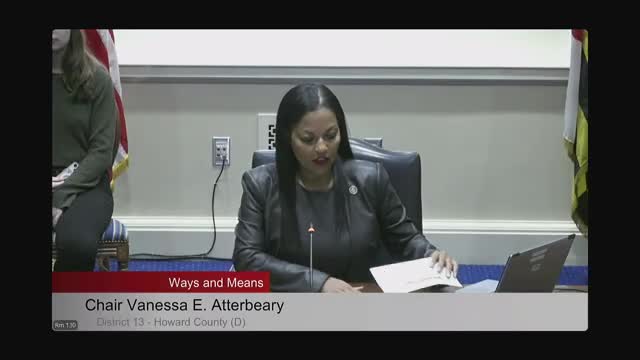Gov. Moore, administration push DECADE Act to retool Maryland economic development
Get AI-powered insights, summaries, and transcripts
Subscribe
Summary
Governor Wes Moore and state economic development officials presented the DECADE Act to the House Ways and Means Committee on March 4, urging targeted investments and tax‑credit reforms to boost Maryland’s growth.
Governor Wes Moore and senior state economic development officials testified March 4 before the House Ways and Means Committee in support of the DECADE Act (House Bill 498), a 130‑plus page package the administration said would reshape Maryland’s business attraction, incentives and targeted investments.
Moore told the committee the DECADE Act seeks to reverse a decade of slow growth by concentrating capital and strategy on a handful of high‑potential sectors, including quantum, AI, cybersecurity and aerospace and defense. “If our economy had grown closer to the national average over the last decade, we would not have a structural deficit,” Moore said in his opening remarks, urging a data‑driven, selective approach rather than broadly funding numerous programs.
The administration proposes $128 million in targeted investments and a revamp of several state programs. Acting Commerce Secretary Harry Coker described specific changes to the Buy Maryland Cyber tax credit: expanding eligible buyers and sellers, removing employee‑size caps, increasing credit amounts available per transaction and making the credit refundable so nonprofits and pre‑revenue firms can use it. Coker said the changes respond to recommendations from the Department of Legislative Services (DLS) and industry groups.
Industry representatives, including Kelly Schultz, CEO of the Maryland Tech Council, and Tasha Cornish of the Cybersecurity Association, voiced support for the bill’s sector targeting and for extending and modernizing research and development credits. Mark Anthony Thomas, CEO of the Greater Baltimore Committee, described the proposal as a reorientation that aligns state, academic and private resources to attract investment and jobs.
Lawmakers pressed the administration on geographic equity and program design. Delegate Jason Buckel (R‑Western Md.) asked whether eliminating the 1 Maryland tax credit and other geographically targeted incentives would hurt historically disadvantaged or rural communities. Moore and Coker said the administration was open to further discussions and pointed to a separate Western Maryland Economic Development Fund as a tool targeted to the region. Delegates from the Eastern Shore and rural counties raised similar concerns, asking how the DECADE Act’s sector focus would benefit areas dependent on tourism, agriculture and legacy manufacturing.
The bill would also split video lottery terminal (VLT) revenue that currently funds two small business assistance programs — the Maryland Small Business Development Financing Authority (MSBDFA) and the Small, Minority, and Women‑Owned Business Account (SMOWBA) — to provide a dedicated, predictable revenue stream for both programs. Committee members representing Prince George’s County and other jurisdictions asked for follow‑up data on how the split would affect local access to capital.
Multiple speakers testified about more technical provisions: TEDCO leaders and venture investors supported allowing passthrough entities to claim biotechnology investment tax credits more efficiently; TECCO and other investors requested changes to Maryland qualification rules so the state can continue backing early‑stage companies as they expand beyond state borders; and MEDCO testified that its revenue bond and financing authorities could help build innovation infrastructure.
Supporters emphasized workforce and site‑readiness complements. John Porcari, a former Maryland transportation secretary, said the state must align transportation and permitting changes with capital to make projects viable. Representatives from higher education and regional economic development organizations said the act’s sector focus could help coordinate university assets and regional initiatives.
Several local officials and county associations asked the committee to preserve local flexibility and existing incentives that they regard as important tools in smaller or rural markets. The administration repeatedly invited continued conversations with legislators on geographic targeting and implementation details.
The Ways and Means Committee did not take final action during the hearing. Committee members and administration staff agreed to continue technical discussions and follow up on data requests, including the proposed VLT revenue split and measures to ensure small and rural jurisdictions can compete for projects under the DECADE Act.
The administration requested a favorable report from the committee.
